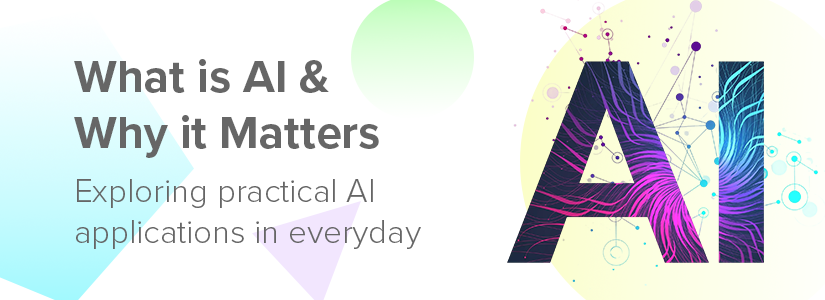What is AI and Why it Matters

Artificial Intelligence (AI) is no longer a futuristic concept. It’s here and revolutionizing how we live, work, and interact with technology. AI is all around us, seamlessly integrated into everyday life—from the voice assistants on our phones to the advanced algorithms that power online recommendations.
If you’re ready to dive deeper, here’s what we’ll cover in this blog:
- What is AI and how it works
- Breaking down the different types of AI
- Exploring practical AI applications in everyday life and business
- Ethical Concerns of AI
- The Future of AI and What It Holds
- Examining AI’s role in email archiving, compliance, and IT management
What is AI?
At its core, Artificial Intelligence (AI) refers to the development of computer systems that can perform tasks typically requiring human intelligence. AI is capable of replicating human cognitive processes to a certain extent, allowing machines to perform functions autonomously that would otherwise require human intervention.
This includes processes like:
- Learning
- Reasoning
- Problem-solving
- Understanding language
- Recognizing patterns
AI systems can automate tasks, solve problems, and make decisions by learning from past experiences. Whether recommending a product on your favorite shopping website or predicting a patient’s health outcomes, AI is at the heart of many modern innovations.
Today, AI has grown into a complex and multifaceted field encompassing several subfields, including machine learning, deep learning, natural language processing (NLP), robotics, and computer vision. The most prominent of which are machine learning and deep learning.
The most prominent of which are machine learning and deep learning.
- Machine learning = training algorithms on large datasets to identify patterns and make decisions without explicit programming.
- Deep learning = A subset of machine learning that mimics the structure of the human brain through neural networks to process and analyze complex data.
Types of AI
AI can be divided into three major categories based on their capabilities and level of complexity:
1. Narrow AI (Weak AI)
This is the most common form of AI today. Narrow AI is designed to perform a single task or a limited range of tasks very effectively.
Examples include:
- Siri
- Alexa
- Google Assistant
It powers sophisticated systems that optimize data retrieval and enhance compliance with regulatory requirements. By improving operational efficiency, Narrow AI helps businesses achieve their goals while minimizing human error and resource costs. While Narrow AI is highly efficient at its designated tasks, it cannot perform outside its specific programming.
2. General AI (Strong AI)
General AI is the next frontier in the field of artificial intelligence. Unlike Narrow AI, which excels at specific tasks, General AI aims to replicate human intelligence in its entirety. This enables machines to perform any intellectual task a human can do. This type of AI is still largely theoretical and remains a subject of intense research.
The goal of General AI -> Create machines that exhibit general-purpose intelligence, capable of understanding and solving a wide range of problems.
While significant progress is being made, General AI is not yet a reality, and its development presents numerous challenges, including ethical and safety concerns.
3. Superintelligent AI
Superintelligent AI refers to a hypothetical future scenario where AI surpasses human intelligence in all aspects
This includes:
- Creativity
- Problem-solving
- Social Intelligence
This type of AI could potentially outperform humans in every field, leading to unimaginable technological advancements—or significant risks. The concept of superintelligence has sparked debates in both the scientific community and popular media, raising concerns about how such powerful AI would be controlled and regulated.
How AI Works
AI functions by learning from vast amounts of data, analyzing patterns, and making decisions based on that information. This process involves collecting and preparing data, training algorithms, and using neural networks to process complex information.
The three main components of how AI works are:
1. Data Collection and Preparation
- The foundation of AI
- Gathering relevant data from various sources, ensuring it’s clean, structured, and ready for analysis
- The more high-quality data a system has, the better it will perform.
2. Machine Learning
- Involves training algorithms using different techniques to help them learn from data
- These techniques include
- Supervised Learning: Trains the algorithm with labeled data.
- Unsupervised Learning: Identifies patterns in unlabeled data.
- Reinforcement Learning: Learns through interactions with the environment and feedback.
3. Neural Networks
- Inspired by the human brain’s network of neurons
- Consists of layers of interconnected nodes (neurons) that process complex data.
- Deep Learning: A subset of machine learning that uses neural networks with multiple layers for analyzing highly complex data.
Why Does AI Matter
As AI continues to evolve, it’s becoming an essential tool for businesses across all industries, including IT and data management. AI enables companies to process large amounts of data quickly and accurately—something humans cannot do as efficiently.
For businesses, the ability to leverage AI for email archiving solutions is crucial. AI-powered systems streamline data retrieval, enhance compliance management, and improve overall business operations by automating repetitive tasks, allowing employees to focus on more strategic work.
AI isn’t just transforming how businesses operate; it’s also improving our day-to-day lives. From voice assistants to AI-based personal finance management apps, AI offers convenience and efficiency. The technology holds promise to revolutionize sectors like healthcare, finance, education, transportation, and entertainment. The more AI advances, the more it will shape industries and redefine the way we interact with technology.
AI’s Impact on Industries and Daily Life
AI is revolutionizing countless aspects of daily life, from routine tasks to complex business operations, enhancing efficiency and creating more personalized and seamless experiences across various industries.
Here’s how AI is making a difference:
- Enhancing Efficiency and Productivity: Aiding industries to work smarter by automating repetitive tasks, speeding up processes, and freeing up people to focus on more creative, high-level work.
- Improving Decision-Making through Data Analysis: By quickly analyzing large amounts of data, AI helps businesses make better decisions, spot trends, and predict future outcomes with confidence.
- Revolutionizing Customer Experiences: From chatbots to personalized recommendations, AI is making customer interactions faster, more accurate, and more satisfying.
Real-World Applications of AI
AI is already transforming a variety of industries, making processes more efficient, accurate, and accessible. From healthcare to entertainment, AI’s impact is everywhere. Here’s how it’s changing the game:
- IT & Cybersecurity: Identifies security threats, predicts system maintenance needs, and helps businesses manage and analyze vast amounts of data, ensuring smooth IT operations.
- Healthcare: AI-driven solutions enhance patient outcomes by improving quality assurance and performance management, streamlining access to critical information, and providing agents with context-rich patient profiles. Organizations can make data-backed decisions with unmatched accuracy.
- Finance: Detects fraud by analyzing transaction patterns, optimizes trades through algorithmic trading, and refines credit scoring, making financial services more accurate and accessible.
- Transportation: Powers autonomous vehicles, enabling self-driving cars, and improves traffic flow with smart management systems. Aids in reducing congestion and making transportation safer and more efficient.
- Customer Service: AI-driven chatbots and virtual assistants provide round-the-clock support, while recommendation systems offer personalized suggestions, keeping customers engaged and satisfied.
Ethical Considerations and Concerns
The advancement of AI brings significant responsibilities, particularly concerning its ethical use and potential impacts.
As this technology continues to advance, so do concerns including:
- Privacy
- Data security
- Bias
Fundamentally, AI systems are only as good as the data they learn from, and if that data is biased, it can lead to unfair or harmful outcomes in areas like hiring, lending, and law enforcement.
AI’s rapid growth also raises big questions about ethics and accountability. While it can boost productivity, it also has the potential to automate jobs and leave some industries facing job losses.
The Future of AI
AI is no longer a technology of the future—it’s a powerful tool that is already transforming industries and everyday life. From improving healthcare outcomes to optimizing business processes, AI promises to reshape industries. However, careful consideration must be given to how AI is developed and integrated into various systems.
For companies like Intradyn, staying ahead of technological advancements means continuously improving email archiving solutions to better serve clients in a rapidly evolving digital landscape. As AI continues to evolve, businesses must ensure they are using it in ways that are ethical, transparent, and secure.
Stay tuned to Intradyn’s blog for more insights on how AI continues to shape the world of email archiving and compliance management.
Summary of Main Points
- AI refers to computer systems that mimic human cognitive processes to perform tasks autonomously.
- Types of AI include: Narrow AI (task-specific), General AI (human-like intelligence), and Superintelligent AI (surpassing human intelligence).
- Relies on high-quality data, machine learning techniques, and neural networks for pattern recognition and decision-making.
- Machine Learning uses algorithms to learn from data while Deep learning mimics the human brain to process complex data.
- AI enhances business operations, particularly in email archiving, data retrieval, and compliance management.
- AI is being used in our daily lives in many ways including powers voice assistants, chatbots, and recommendation systems, offering convenience and personalized experiences.
- Real-World Applications: AI is transforming healthcare, finance, transportation, entertainment, and IT with smarter systems and improved efficiency.
- Ethical Concerns about AI raise issues like data privacy, security, bias, and the potential for job automation.
- The future of AI is reshaping industries, and businesses must ensure ethical, transparent, and secure AI integration.

